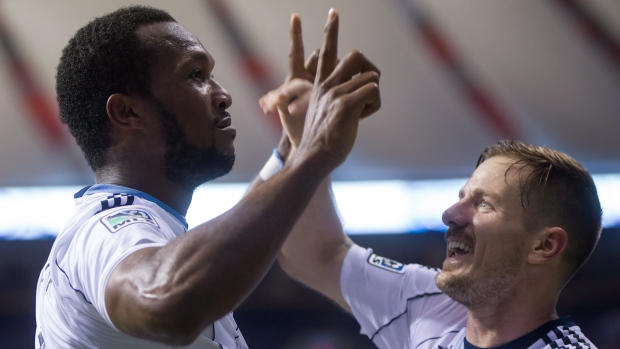Oct 26, 2014
deVos: Whitecaps' success comes from team chemistry
“We just didn’t get the bounce of the ball.” “Some of the decisions just didn’t go in our favour.” “We just didn’t capitalize on our chances.” These are all common excuses that are offered up by losing teams. Whether general managers, coaches or players voice them, they always sound like hollow clichés; attempts to find meaning in a failed season without ever addressing the real problem.
By Jason deVos

“We just didn’t get the bounce of the ball.”
“Some of the decisions just didn’t go in our favour.”
“We just didn’t capitalize on our chances.”
These are all common excuses that are offered up by losing teams. Whether general managers, coaches or players voice them, they always sound like hollow clichés; attempts to find meaning in a failed season without ever addressing the real problem.
Contrast these excuses with what you hear from winning teams.
“Every player on this team is behind the manager and what he is trying to do at the club.”
“We have an incredible spirit in this group; there are no bad characters in our locker room.”
“When one of us is beaten on the pitch, the others dig him out of trouble and pick up the slack.”
Do you see the difference? Losing teams make excuses about bad luck, about being cheated by the referee or about failing to execute in decisive moments. Winning teams talk about the strength of the relationships they have between their players.
The strength of those relationships is often referred to as team chemistry. Winning teams have it and losing ones don’t.
Signing new players can often disrupt a team’s chemistry because doing so introduces new variables into the team dynamics. There is a hierarchy in every locker room; there are leaders and there are followers, there are big personalities and there are quiet ones. When new personalities come into the group in the form of new signings, it can often upset the equilibrium that has been carefully crafted by the manager.
It makes midseason signings even more precarious, because the team has already established its own hierarchy. It is one reason why midseason signings often need a full preseason with their new team to fully settle; they need to find their place within the team’s hierarchy, and this is often done over the course of preseason.
This makes it a real challenge for any manager to integrate new players into his team during the season. Which makes the Vancouver Whitecaps’ midseason additions of both Kendall Waston and Mauro Rosales even more impressive.
Both players have settled into the Whitecaps’ team very quickly and have played vital roles in Vancouver’s push to the MLS playoffs. Waston scored the only goal of the game in Saturday’s 1-0 victory over the Colorado Rapids, while Rosales has added genuine pedigree to the Whitecaps’ midfield alongside Pedro Morales.
Their value on the field is the easiest thing to assess. When Waston won everything in the air in the final 15 minutes of the Whitecaps’ 1-0 victory in Seattle over the league-leading Sounders two weeks ago, fans could see the importance of finally having a dominant central defender in the team. When Rosales set up both of Sebastian Fernandez’s goals in Vancouver’s 2-0 win over FC Dallas the week prior, fans could see the importance of getting quality service from wide areas in the team.
Their value off the field is much more difficult for fans to quantify. Fans often don’t get to see what goes on behind the scenes, so making that assessment is largely down to guesswork.
But there are clues to be seen if one looks closely enough.
Waston is a gentle giant who walks around with a perpetual grin on his face. He has a huge personality, which comes across in his interviews and promotional appearances. But on the field he is not to be messed with, and he has brought a considerable physical presence to the Whitecaps’ lineup. When he scored on Saturday, he was mobbed by his teammates – all of them appreciative of what the “big man” has brought to the team.
When Kekuta Manneh came into Saturday’s game as a substitute, he brought energy and urgency to the Whitecaps’ play. He forced Colorado onto the back foot and gave their defenders fits with his direct running. After Waston scored the go-ahead goal, Manneh continued to drive forward looking for another goal. In one sequence, after taking on three defenders, Manneh was sent sprawling to the turf but no foul was called.
The Rapids immediately took possession and looked to hit Vancouver on the counter attack. Yet who was the first Whitecap to sprint 40 yards to put pressure on the ball with Manneh caught out of position? 33-year old Rosales.
Given Rosales’ background in the game – he has played for storied sides like Dutch club Ajax and Argentina’s River Plate and Newell’s Old Boys – it would be easy for him to rest on his laurels and let his teammates carry the workload.
But Rosales has done the opposite. He has knuckled down and worked his socks off since arriving in Vancouver, often leading the charge in games when possession needs to be recovered. His technical ability is superb, but it is his work-rate and professionalism that has been most impressive to his teammates. He routinely works with Vancouver’s younger players, passing along the years of knowledge he has gained to the next generation.
That attitude is infectious, and it is one reason why the Whitecaps clinched a playoff berth in Carl Robinson’s first year in charge of the club. With four wins and 13 points from their last five games, Vancouver is one of the hottest teams in Major League Soccer heading into the playoffs.
The Whitecaps travel to Texas on Monday to prepare for their MLS Playoff Knockout Match against FC Dallas, live on TSN on Wednesday night.
